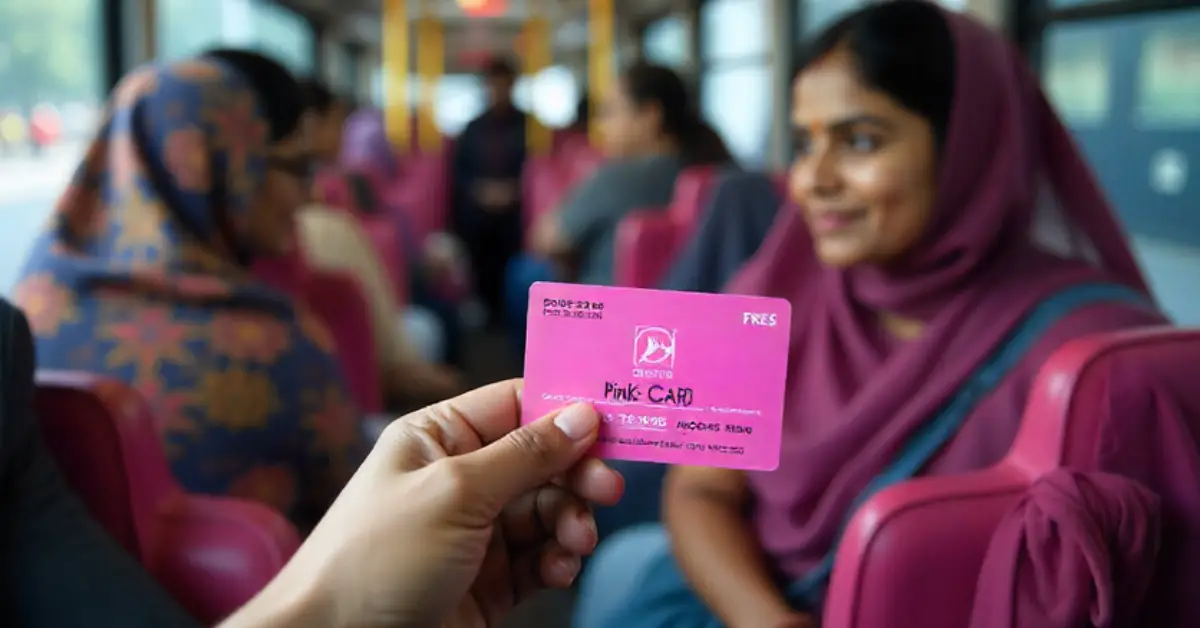The Delhi government will issue pink cards for women and transgender commuters starting October 23, 2025, which provides free bus travel across the capital. This initiative seeks to improve the mobility and inclusivity of women and transgender residents with a digital and efficient option for everyday travel. With the pink card launch, Delhi will take considerable strides in the modernization of public transport, in safeguarding accountability on subsidies, and in coordinated integration on buses, the Metro, and other public transport.
In a landmark move aimed at enhancing public transportation accessibility, the Delhi government is set to launch the much-awaited pink “Saheli” smart cards, offering free bus travel for women and transgender residents. Expected to roll out around the time of Bhai Dooj on October 23, 2025, this initiative promises to streamline travel across Delhi’s vast network of buses, the Metro, and other public transport systems. The launch will mark a significant step forward in Delhi’s push for smarter, more inclusive transportation solutions.
A Step Towards Digital Mobility
The Delhi Transport Corporation (DTC) is in the final stages of collaborating with banks to issue the National Common Mobility Card (NCMC) and its local variants, including the “Saheli” smart card. These cards will allow commuters to seamlessly travel across different modes of transport in the capital. Card-reading machines have already been installed in nearly all DTC buses, and the phased deployment of the new system is expected to begin soon.
The initiative is designed to bring efficiency and convenience to daily commuters, particularly women and transgender individuals, who will benefit from the pink cards. The move also replaces the current paper-based travel slips issued by conductors, providing greater accountability and transparency in the subsidy system.
A Range of Card Options
The new card system will offer three types of cards:
- Pink Cards – These will be exclusively for women and transgender residents of Delhi, granting them free travel on DTC and cluster buses. They will also be able to top up their cards for paid travel on the Metro and other modes of transport.
- Blue Cards – Aimed at general commuters, these will function as prepaid mobility cards for travel across various modes of transport.
- Orange Cards – Targeting monthly pass holders, including students and senior citizens, these will digitize the existing paper-based monthly passes. The orange card will be validated on Electronic Ticketing Machines (ETMs) for ease of use.
While the blue and orange cards will be available to a broader pool of commuters, the pink cards will only be available to residents of Delhi. To apply for the pink card, commuters must provide valid proof of residence within the city. The free bus rides, however, will not be limited to residents in the long term, as the card system will ensure a more accountable subsidy system for those eligible.
Strengthening Public Transport Accessibility
With a daily ridership of approximately 2.9 million people across buses, DTC is catering to an immense and diverse demographic. The new card system aims to bring digital convenience to these passengers, offering a more organized, efficient, and transparent way to travel. As the capital’s transport infrastructure continues to evolve, these new smart cards are expected to be a game-changer for millions of daily commuters.
Women and transgender commuters, in particular, will benefit from the introduction of the Saheli card, which offers not only free bus rides but also the flexibility of topping up the same card for paid journeys on the Metro and other transport services.
The Growing Need for Smart Mobility Solutions
Delhi’s public transport system, with its high ridership, is undergoing a significant transformation. Between January and June 2025, DTC buses, including cluster buses, carried an average of 1.43 million male passengers and 1.48 million female passengers daily, excluding those with monthly passes. This highlights the importance of introducing efficient and user-friendly systems that cater to the growing demand for smart mobility solutions.
The shift towards the Saheli card aligns with a broader global trend toward digital payment solutions, where cities are increasingly moving away from paper-based tickets to smart cards and digital wallets. This move not only ensures convenience for passengers but also paves the way for a more sustainable, tech-driven future for public transportation in Delhi.
Two Variants to Choose From
The new mobility cards will be available in two variants: Zero-KYC and Full-KYC. The Zero-KYC cards can be issued instantly from participating banks or DTC centers using a mobile number and Aadhaar OTP. These cards will function as prepaid travel cards, allowing users to load money onto them for bus and Metro rides. Full-KYC cards, however, will require personal identification and will include the user’s photograph. These cards will double as debit cards, allowing for regular transactions beyond just travel.
This new initiative in Delhi reflects the city’s commitment to improving public transportation accessibility while keeping pace with technological advancements in urban mobility. As the roll-out date approaches, commuters can look forward to a more inclusive, accountable, and seamless travel experience.
As part of a digital system implementation aimed at integration with other transport modes, accountability, seamless travel, and facility enhancement, the Delhi government will introduce pink cards for women and transgender commuters, allowing for free travel on the capital’s buses, commencing October 23, 2025.
The Saheli card’s implementation will be a great addition to the transport system for Delhi, which is a step towards the provision of free, digitized travel for all women and transgender individuals in the capital. With the cards’ rollout, the city will be able to offer, for the first time, a smart and advanced equitable transport system designed for all commuters.
Source: Travel And Tour World







